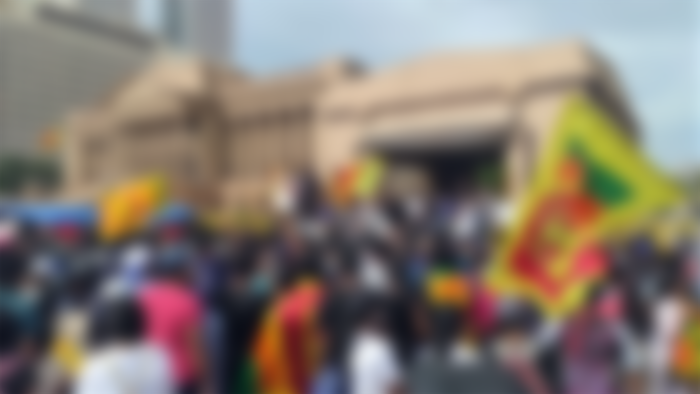Sri Lanka could go bankrupt due to Russian invasion of Ukraine

As you might have seen in the news, Sri Lanka is suffering through a bit of a crisis. The Sri Lankan economy wasn't in a great state going into the pandemic, but when tourism dried up and the economy was put on hold to stop the spread of the virus, it became pretty clear that Sri Lanka wasn't going to be able to pay its debts. Sri Lanka's economic crisis transformed into a political crisis, forcing the resignation of an entire cabinet and triggering widespread protests that have since resulted in the death of at least one protester at the hands of Sri Lanka's security forces.
As we said, it's important to remember that Sri Lanka's economy was always pretty vulnerable even before the pandemic. There were a few reasons for this. First, Sri Lanka has a particularly rickety tax system. Tax revenues usually amount to about 13 percent of GDP, when you'd expect them to be more like 20 percent. Second, successive Sri Lankan governments have borrowed too much money. For the last 20 years or so, Sri Lanka has run a budget deficit averaging about seven percent, which is significantly more than similar developing countries. These loans have often been used to pay for expensive vanity projects, like the infamous international port, which was financed with Chinese loans. When Sri Lanka was unable to pay back the loans, it was ultimately handed over to a Chinese conglomerate with a 99-year lease.

Hambantota port, CSIS
Now, to be fair to the Sri Lankan government, this policy has its merits. The increased fiscal stimulus contributed to Sri Lanka's impressive growth over the last few years. Sri Lanka's GDP per capita has accelerated past that of its neighbors, averaging an annual growth of nearly five percent pre-pandemic. However, despite impressive growth, Sri Lanka's economy was still vulnerable because it relied on imports. As an island nation, Sri Lanka needs to import a lot of fuel, food, and medicine. As a result, it runs a current account deficit of about 4% of GDP on average. Get the idea that Sri Lanka imports a lot of stuff and borrows a lot of money to pay for it, and without a significant tax system to support it, their economy is always vulnerable to some sort of economic slowdown. As soon as the loans dried up, Sri Lanka struggled to pay for its imports.
Sri Lanka's economic woes haven't been helped by its political class. The governing coalition from 2015 until 2019 didn't get anything done, largely. Because the two main parties only really agreed on their mutual opposition to the Rajapaksa family, who dominated Sri Lankan politics for most of the 21st century, the Rajapaksa family is headed by three brothers, Mahinda, Gotabaya, and Basil. Mahinda was president from 2005 until 2015 and is currently prime minister. Gotabaya was defense minister from 2005 until 2015 and he's currently president. And Basil, who's currently considered the brains behind the family, was finance minister from 2010 until 2015 before being charged with corruption in 2016.

Anyway, the coalition opposed to the family that took power in 2015 didn't get much done. This led to the Rajapaksas promptly retaking power in 2019 when Gotabaya won the presidential election and immediately called for parliamentary elections, where the Sri Lankan people's front won a 145 percent supermajority, making Mahinda prime minister. Unfortunately for Sri Lanka, the Rajapaksas have proved incapable of sorting out Sri Lanka's economic woes. After cutting taxes, lowering interest rates and ditching an IMF program agreed upon in 2016, Sri Lanka's budget deficit jumped from 5.3 percent in 2018 to 9.6 percent in 2019 and 11.1 percent in 2020. Spiraling government debts and the pandemic-induced collapse in the tourism sector meant that Sri Lanka was quickly running out of foreign currency, which is needed to prop up the rupee.
In essence, Sri Lanka's central bank was using its foreign currency to buy Sri Lankan rupees to protect the currency's value. It was doing this because, as we mentioned earlier, Sri Lanka is very reliant on imports, and if the value of the rupee crashed, Sri Lanka would be unable to buy essential imports like fuel, food, and medicines. A currency crisis was inevitable, with no new foreign currency coming in and a lot of going out. By February 2022, Sri Lanka's foreign currency reserves had fallen to 700 million dollars. There is nowhere near enough to pay off the 4 billion worth of offshore government debt due this year. On March the 7th, the central bank gave up protecting the rupee and allowed it to devalue by 15 percent. A few days later, they gave up completely, allowing the currency to float freely, and the currency devalued by another 15%. The Sri Lankan rupee is traded at about 330 to the dollar, up from 200 a few months ago.

Price change of LKR in one year, XE
As you'd expect, when Sri Lanka's economy devalued, imports got more expensive and inflation spiked. Things weren't helped by the war in Ukraine, which was independently pushing up global commodity prices. In March, year-on-year inflation reached a 15-year high of 18.7 percent, driven by increases in fuel and food, which were up 44% and 30.2%, respectively. Sri Lanka's economic crisis turned into a political crisis on April 1. In response to nationwide protests on April 1, the government declared a state of emergency and a ban on social media, only to revoke it two days later after protests continued. Gota and Mahinda promptly resigned, and on April the 5th, a coalition partner withdrew their support, leaving Gota with a minority in parliament.
On April the 8th, the central bank raised interest rates from 7.5 to 14.5 percent, and over the weekend, the new finance minister announced that the government would raise taxes and fuel prices while reducing spending and selling off unwieldy state-owned enterprises. On April 12, Sri Lanka announced it would stop servicing its foreign debts, the first sovereign debt default in Sri Lanka's independent history. On Tuesday, Sri Lanka's state-run oil and gas body raised the price of petrol by another 20 percent, having raised it by 44 in March, which triggered even more violent protests. After 15 hours of continuous protests, police in the town of Rabocana used live rounds on protesters, killing one and injuring 14. So what happens next?

Well, the protest will almost certainly continue, and you can understand why Sri Lankans are upset. At the time of writing, Sri Lanka is facing fuel, food, and medicine shortages with 10 to 13-hour rolling power cuts. The radiopax who have so far refused to step down will probably have to agree to a new IMF bailout, just a few years after ditching Sri Lanka's previous IMF program. The UN has suggested that in the meantime, Sri Lanka could implement a debt for nature scheme where Sri Lanka borrows money in exchange for agreeing to conservation and sustainability programs. All in all, things are getting pretty desperate for Sri Lanka. Debt for nature schemes are not a substitute for access to international capital markets, and any IMF bailout will come with uncomfortable austerity conditions.

Finally, Sri Lanka is far from the only developing country suffering from an unsustainable debt burden. Lots of poorer countries are already struggling with rising inflation and tightening interest rates. The current solution, which involves IMF imposed austerity, is probably insufficient. If the world wants to keep the economies of the developing world going, it might have to get a bit more creative about it.






I love Sri Lankans because one of the church I just met came from that country. Who did gave the country loan again? Importing products then lower the value of country's currency? If I understand it right...
Reading articles like this makes me more courageous- to know about the world events that push us citizens to be more aware of what we do with our lives and what should we do that could uplift each other. We are ignorant for so long that it's time to create a better balance life for us and our children's children. Instead of having debts, we wish that we are the one who will lend money and get interest from it.